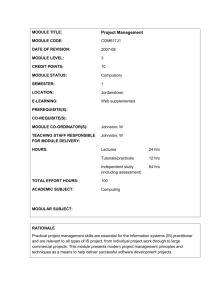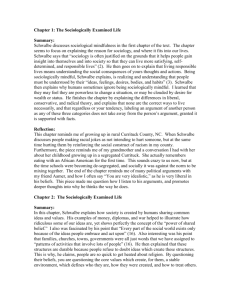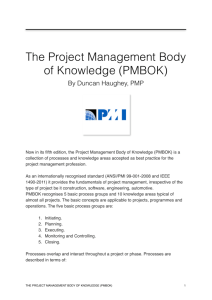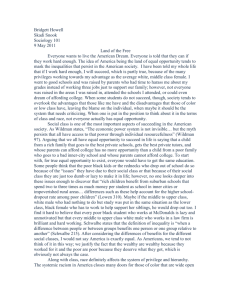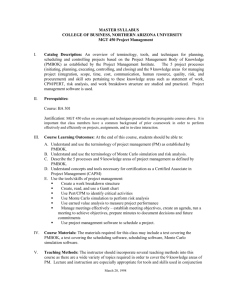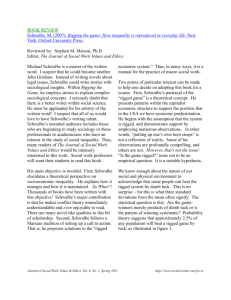BMIS 2551 Project Management Concepts and Processes
advertisement
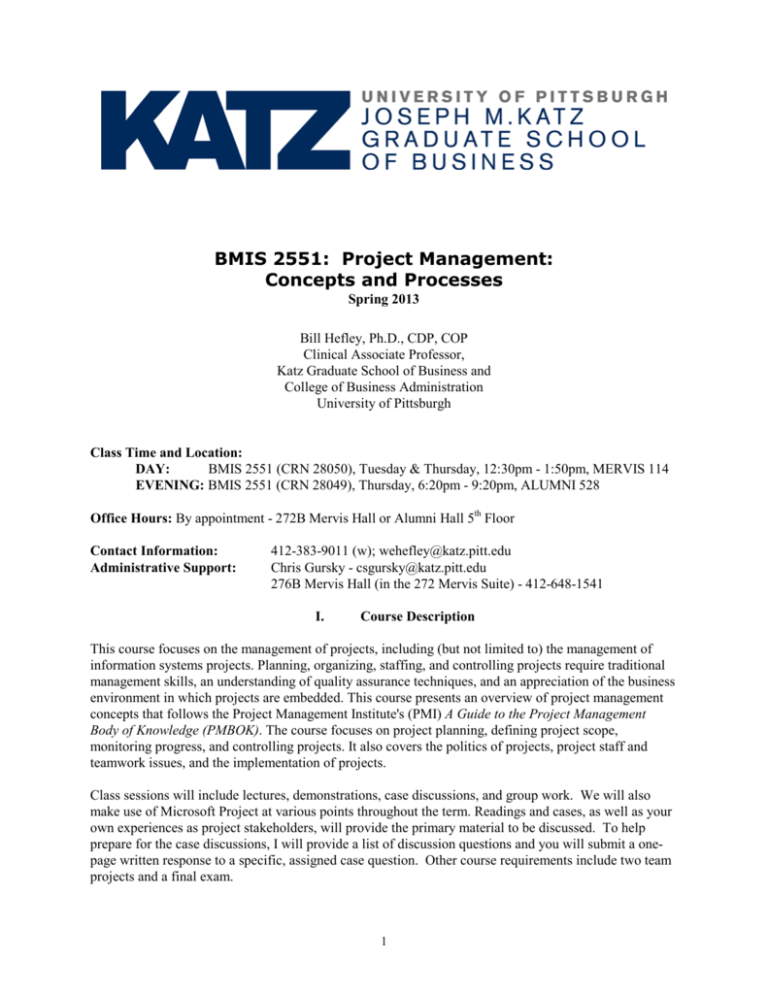
BMIS 2551: Project Management: Concepts and Processes Spring 2013 Bill Hefley, Ph.D., CDP, COP Clinical Associate Professor, Katz Graduate School of Business and College of Business Administration University of Pittsburgh Class Time and Location: DAY: BMIS 2551 (CRN 28050), Tuesday & Thursday, 12:30pm - 1:50pm, MERVIS 114 EVENING: BMIS 2551 (CRN 28049), Thursday, 6:20pm - 9:20pm, ALUMNI 528 Office Hours: By appointment - 272B Mervis Hall or Alumni Hall 5th Floor Contact Information: Administrative Support: 412-383-9011 (w); wehefley@katz.pitt.edu Chris Gursky - csgursky@katz.pitt.edu 276B Mervis Hall (in the 272 Mervis Suite) - 412-648-1541 I. Course Description This course focuses on the management of projects, including (but not limited to) the management of information systems projects. Planning, organizing, staffing, and controlling projects require traditional management skills, an understanding of quality assurance techniques, and an appreciation of the business environment in which projects are embedded. This course presents an overview of project management concepts that follows the Project Management Institute's (PMI) A Guide to the Project Management Body of Knowledge (PMBOK). The course focuses on project planning, defining project scope, monitoring progress, and controlling projects. It also covers the politics of projects, project staff and teamwork issues, and the implementation of projects. Class sessions will include lectures, demonstrations, case discussions, and group work. We will also make use of Microsoft Project at various points throughout the term. Readings and cases, as well as your own experiences as project stakeholders, will provide the primary material to be discussed. To help prepare for the case discussions, I will provide a list of discussion questions and you will submit a onepage written response to a specific, assigned case question. Other course requirements include two team projects and a final exam. 1 Course Goals. Upon completion of this course, you should be able to: • • • • • • • • • • define a project understand project management concepts understand project management processes develop a WBS for a project develop plans for a project • identify project risks and ways to mitigate the risks control and coordinate project activities recognize and address project politics assess the advantages and disadvantages of sourcing options use Microsoft Project Books & Course Materials Required Text Books A required text is An Introduction to Project Management, Fourth Edition (REQUIRED) Kathy Schwalbe • ISBN: 9780982800331 The Schwalbe text is based on PMI’s PMBOK guidelines. This text contains required readings for the lectures and for independent study. It also provides exercises for students to perform independently and in the lab to understand the fundamentals of MS Project, and to reinforce the concepts presented in class. This edition introduces MS Project 2010, which will be used for course assignments. An additional text is • Project Management Institute. (2008). A Guide to the Project Management Body of Knowledge, (PMBOK Guide), Fourth Edition. PMI, Newton Square, PA. (ISBN 13: 978-1-933890-51-7). The PMI guide (commonly referred to as PMBOK) is not a textbook, but a summary of project management knowledge as established by the Project Management Institute. It will be especially useful if you decide to sit for the PMI's CAPM or PMP certification exams following the course. The PMBOK, 4th Edition, has recently been adopted as an IEEE standard, and as such it is available through the Library system in the IEEExplore database. You can access it at www.library.pitt.edu -> Find Articles -> Databases by Title -> IEEExplore -> Connect to the database -> Search for "IEEE Std 1490-2011" , and then you can download the full PDF of the document. This document will certainly help you study for the CAPM exam. If you are accessing this from off-campus, be sure to login through the Library site to retrieve this document. Recommended Text Book An optional text is • Microsoft Project 2010 (Microsoft Official Academic Course) (OPTIONAL) Microsoft Official Academic Course • ISBN: 9780470638880 2 Although the Schwalbe book has an excellent introduction to MS Project in its Appendices, this text is the official MS Project course textbook. For those wanting more in-depth, hands-on introduction to MS Project, this book may be useful. Course Materials You will also find the course syllabus, power point lecture notes, and other related material on Courseweb at http://courseweb.pitt.edu. Please check Courseweb weekly for announcements or additional readings. Cases In addition, a package of six cases will be available electronically via http://cb.hbsp.harvard.edu/cb/access/16754789 1. R, D. Austin; W. Ritchie; G. Garrett Volkswagen of America: Managing IT Priorities. Harvard Case 9-206-003. 2. F. W. McFarlan; J, Hupp; M. Kell AtekPC Project Management Office. Harvard Case 9-308-049. 3. F. Gino; G. P. Pisano. Teradyne Corporation: The Jaguar Project. Harvard Case 9-606-042. 4. L. M. Applegate; R. Montealegre; H. J. Nelson; C.-I. Knoop. BAE Automated Systems (A): Denver International Airport Baggage-Handling System. Harvard Case 9-396-311. 5-6. Jeffery, M., et al. (2008). A&D High Tech (A): Managing Projects for Success. Kellogg Case 156. Jeffery, M., et al. (2008). A&D High Tech (B): Managing Scope Change. Kellogg Case 158. Microsoft Project You will use Microsoft Project in this course. I will request access for all students registered (following the Add/Drop deadline). If you do not received an email with instructions, please let me know. You should also check your junk or spam folder for this e-mail. II. Grades The Katz School has adopted grading guidelines, and they will be followed in this class. That means that approximately 1/3 of the class will achieve grades in the A range (A, A-), and 2/3 will earn grades in the B range (B+, B, B-) or below. In this class, an "A" denotes excellent and outstanding performance in all areas of the course, a "B" denotes good, solid performance, and a "C" denotes acceptable performance. Grades will be based on: Individual Work: Case Responses (I will count the highest 3 scores of these 4 cases – Volkswagen, AtekPC, Teradyne, BAE.) Final Exam General Class Participation / Attendance 3 15 % 30 % 10% Teamwork (in groups of 4 or 5): Case response (A&D)* Team project* (Part w/ lowest score of four dropped) Part 1: Initiation and Initial Project Scope Mgmt Part 2: Scope, Time, and Cost Mgmt Part 3: Quality and Risk Mgmt Part 4: HR, Communications, and Procurement Mgmt TOTAL: 20 % 25 % 100 % Your grade will reflect my assessment of your performance. Much (but not all) of the grading in this course is subjective in nature in the sense that there is no one "right" answer. Highest grades are given to responses (case write-ups, participation, homework, etc.) that are complete and insightful, that synthesize and integrate class material, and that apply classroom material appropriately. I will provide you with feedback on your grades through Courseweb’s Gradebook feature. Please talk to me anytime if you have questions or concerns. I put a great deal of effort into grading to ensure that the grades are equitable and fair. However, if you feel that your grade does not reflect your performance, you may resubmit your work to me for re-grading consideration. Submit the original work along with a statement of why you feel the grade is incorrect, within seven days of receiving the grade. I will consider your request and return my response to you within seven days. I reserve the right to re-grade the work in its entirety. Please note that I do not accept late assignments unless there is an extraordinarily good reason to do so. III. Assignments A. Case Preparation, Responses, and Discussion Good case discussions are founded on adequate preparation. To help you prepare, I will give you a set of study questions for each case. These study questions are meant to focus your thinking, and to help you prepare for the in-class discussion. Though the study questions do not necessarily represent a complete analysis of the situation, they should provide you some guidance in how to think about the case and the issues it presents. You are not required to prepare formal responses to all of the study questions. However, to ensure your preparation for the class discussion, you will prepare a written response to one specific question about each of the cases. You must hand in a one-page, single-spaced response for 3 of the 4 cases. The response is due at the beginning of the class period in which the case is discussed. Your response will address a designated study question. This essay is an individual assignment; you should not discuss with others the study question before you write your essay. I have set some rather strict formatting requirements for the individual case responses. Please adhere to these requirements, as they serve to level the playing field for everyone: • • Don't use a cover sheet. Put your name at the top of the page somewhere. Put the question at the top of your response. 4 • • • • Start your response by stating your position or decision. Then continue with your reasoning. Support your arguments with facts from the case or elsewhere. Use clear, tight logic. There are no "right" answers to these questions; it is the rigor of your analysis that is important, and that forms the basis of your grade. Do not waste space rehashing what is in the case. Report case data only when you need to support a point or to deflect a counterpoint. Be sensitive to obvious alternatives to the position you are taking. Restrict your response to one-page, single spacing, using a reasonable-sized font and 1” margins. Attachments/exhibits are permitted. During class, we will discuss the cases. Spirited class participation is encouraged and informed discussion in class is expected. This requires completing readings and assignments before class. You are expected to attend each class, to be prepared, and to contribute to the class discussion. Participation in the classroom is important because it helps solidify your understanding of the material, gives you experience in presenting and supporting your ideas, and offers your peers varying perspectives on class material. Your classroom participation will be evaluated on three general dimensions. First, do your peers pay attention to your comments, and do your comments provoke further discussion, or not? Second, do you pay attention to the thread of the discussion, maintaining continuity, or do your comments "loop back" or go off on tangents? Third, are your comments supported by facts, or are they vague generalizations? Your contributions to the discussions are worth a total of 10 percent. If you rarely speak up in class, or miss several classes, your participation grade will not be higher than 6 out of 10 possible. If you occasionally contribute, your grade will be in the 7 – 8 range (depending on how frequently you contribute and how well prepared you are). For a grade of 9 – 10, your comments indicate that you have carefully read and thought about the material, that you can apply conceptual material from the lecture or readings to the current discussion, that you can integrate comments from previous students, that you can present and support an alternate point-of-view, and so on. Please note that attendance affects your grade in that if you are not in class, you cannot participate. Excessive absences will have a negative impact on your grade for class participation. After each class, I make notes about classroom participation and attendance. B. Team Project During the semester, your self-selected 4- or 5-person group will complete 4 assignments (i.e., parts, see below) related to managing a [pseudo] project. These assignments are meant to give you an opportunity to apply material that is covered in the text and/or during class. You should choose a pseudo project that is important to the members of the team and that circles a knowledge area that is well understood by at least one team member. These assignments will involve you applying concepts you are learning in the course to your pseudo project. It is possible that some class time will be devoted to these assignments, but they will require work outside of the classroom as well. If your group completes Parts One though Four, then I will drop the part with the lowest score. 5 Prework: Project Topic This is your first group assignment. The topic of your pseudo-project must be approved by the instructor. Your group should make a submissions that is based on Schwalbe Chapter 2, Team Project 3, due Jan 24th. Your group submission should consist of your list of projects proposed by team members and a brief description of each (no more than a paragraph), your scoring model for selection, identification of your selected group project, and a description of the proposed project scope for the selected project. From this brief scope description I should be able to understand enough about the proposed scope to be able to understand if this is big enough or complex enough or too big or too complex. Additional criteria that your proposed project must meet to be acceptable are • non-trivial (prospective WBS of a measurable size; i.e., Can you create a three-level (or deeper) WBS for the technical processes in your project?) • must have a portion that will be procured (as you will be developing a procurement plan, so is there a part or subsystem that you can procure or contract out?) • commitment (you’ll be working with this project all semester, so is it something that all of your team can get into?) Part 1: Initiation and Initial Project Scope Management Using chapters 1 through 4 of the PMBOK as well as Schwalbe text and related lecture material, for your pseudo-project, develop a Project Charter and a Project Scope Statement. Your Project Charter should contain: • • • • • • • • • • Project Purpose or Justification Business Needs, High-Level Project Description, or Product Requirements Business Case including ROI Stakeholder Influences Description of Functional Organizations that are participating Assigned Project Manager and Authority Level Organizational, Environmental, and External Assumptions Organizational, Environmental, and External Constraints Requirements that satisfy customer, sponsor, and other stakeholder needs, wants, and expectations Summary Budget Your Project Scope Statement should contain: • • • • • • • • • Project and Product Objectives Product or Service Requirements and Characteristics Product Acceptance Criteria Project Boundaries Project Requirements and Deliverables Project Constraints Project Assumptions Initial Project Organization Initial Defined Risks 6 • • • • • Schedule Milestones Initial WBS Order of Magnitude Cost Estimate Project Configuration Management Requirements Approval Requirements Part 2: Scope, Time, and Cost Management Using chapters 1 through 7 of the PMBOK as well as Schwalbe text, related lecture material, and my feedback on Part 1 for your pseudo-project, revise your Project Charter and Project Scope Statement. Using MS Project, and the MS Project template files provided in Courseweb, develop your Work Breakdown Structure, Project Schedule, and Project Budget for your pseudo-project. Be sure to turn in a MS Project file that contains a WBS (within the Gantt Chart view) as well as schedule activities (also within the Gantt Chart view). Be sure to determine work amounts and durations for each activity. Be sure to indicate work resources and to assign costs to these work resources. Be sure to indicate the maximum amount of effort that can be expended by a work resource. Be sure to set a baseline. Use the visual and other reporting functionality in order to determine that you have entered your information appropriately. Part 3: People, Communications, and Procurement Management Using chapters 1 through 8 and 11 of the PMBOK as well as Schwalbe text, related lecture material, and my feedback on Part 2 for your pseudo-project, revise your Quality Management Plan and Risk Register. Additionally, using chapters 9, 10, and 12, and your previous work, develop Human Resources, Communications, and Procurement Management Plans affiliated with your pseudo-project. Part 4: Quality and Risk Management Using chapters 1 through 7 of the PMBOK as well as Schwalbe text, related lecture material, and my feedback on Part 2 for your pseudo-project, update (as needed) your MS Project file for your Work Breakdown Structure, Project Schedule, and Project Budget for your pseudo-project. Additionally, using Schwalbe text, and your previous work you should develop a Quality Management Plan and a Risk Register affiliated with your pseudo-project. Your quality management plan should address how you will assure process quality as well as how you will control product quality. Requirements for Deliverables Use a cover sheet. On this cover sheet, left justified and centered, indicate which of the following your assignment is Part 1: Initiation and Initial Project Scope Management Part 2: Scope, Time, and Cost Management Part 3: Quality and Risk Management Part 4: People, Communications, and Procurement Management On this cover sheet, left justified and centered, indicate the date, in Month Day, Year (e.g., January 15, 2012) format, put all of your full names, my full name, the course number, and the course name. For the rest of the assignment, restrict your response to as few of pages as possible, single spacing, alignment set at “Justified” in MS Word or the similar setting in another word processor (e.g., justified to both the right and left margins), using 11-point Times New Roman font, single spaces, and one inch margins. Name these files using this convention. Lastname1.lastname2.lastname3.project.part#.MMDDYY.doc (or 7 Lastname1.lastname2.lastname3.project.part2.mpp for the MS project file in Part 2) and submit these files to the corresponding assignment in Courseweb. IV. Week Topic Course Introduction 1– Jan 10 (H) Course Calendar Readings Covered (please read materials before class) PMBOK Chapter Covered (please read materials before class) Schwalbe Chapter 1 PMBOK 1, 2 Exercises & Assignment Due (Please complete / submit before Thursday class begins) Introduction to PM Project, Program and Portfolio Management PM Profession Project Management Process Groups 2– Project Integration Jan 15 (T) Management Jan 17 (H) Selecting Projects: Project Selection / Group Selection (in class Thursday) GK-PM white paper (on Courseweb) Templates – Schwalbe 456 Schwalbe Chapter 2 PMBOK 3, 4 Project Proposal (Schwalbe 459) due Jan 17th – Load into Group File Exchange and into Assignment in Courseweb (Individual) PMBOK 4 Prework: Project topic due Thursday Jan 24th (group) Read Volkswagen of America: Managing IT Priorities case before Thursday class. Schwalbe Chapter 3 3– Jan 22 (H) Project Charter & Jan 24 (T) Business Case Volkswagen of America case response #1 due Thursday (Individual) 8 Week 4/5 – Jan 29 (T) Feb 5 (T) Feb 7 (H) Topic Project Scope Management Readings Covered (please read materials before class) PMBOK Chapter Covered (please read materials before class) Read Schwalbe Chapter 4 – to page 136 PMBOK 5 6, 7 Team Project, Part 1: Initiation and Initial Project Scope Mgmt due Thursday Chapter 7 – pages 286-303 Skim Schwalbe, Appendix A. Skim A&D High Tech (A) & A&D High Tech (B). Schwalbe Chapter 5, pages 185-190 7– Feb 19 (T) Project Human Resource Feb 21 (H) Management NOTE: NO CLASS ON THURSDAY, Jan 31. AtekPC Project Management Office case response #2 due Thursday Feb 7. Read Schwalbe Chapter 4 – pages 37-176 Project Time Management / Project 6– Cost Management: Feb 12 (T) Schedules and Budgets Feb 14 (H) Exercises & Assignment Due (Please complete / submit before Thursday class begins) PMBOK 9 Chapter 6, pages 243-265 Read Teradyne Corporation: The Jaguar Project case. 9 Week 8– Feb 26 (T) Feb 28 (H) Topic Project Communications Management Project Stakeholder Management 9– Mar 5 (T) Mar 7 (H) Mar 12 (T) Mar 14 (H) Change Management Readings Covered (please read materials before class) PMBOK Chapter Covered (please read materials before class) Read Schwalbe Chapter 5, pages 191-197 10 Chapter 6, pages 266-272 PMBOK 5th Ed. Changes (on Blackboard) Chapter 7, pages 310-314 Schwalbe Chapter 6, pages 228-240 Exercises & Assignment Due (Please complete / submit before Thursday class begins) Team Project, Part 2: Scope, Time, and Cost Management due Thursday. PMBOK 4 Teradyne Corporation: The Jaguar Project case #3 due Thursday. Chapter 7 – pages 294-295 SPRING BREAK NO Class this week Schwalbe Chapter 5 – 198208 Chapter 7 – pages 314-315 10 – Project Risk Management Mar 19 (T) Mar 21 (H) Read BAE Automated Systems (A): Denver International Airport BaggageHandling System case. 10 PMBOK 11 A&D High Tech (A)&(B) due Thursday. (Group Assignment – Strongly encouraged to complete as a group; however, everyone must submit this case response, etiher as an individual or as part of a group response.) Week Topic Readings Covered (please read materials before class) PMBOK Chapter Covered (please read materials before class) Schwalbe Chapter 5 – pages 208-220 PMBOK 12 Exercises & Assignment Due (Please complete / submit before Thursday class begins) Chapter 6 – pages 273-278 Project Procurement Management 11 – Mar 26 (T) Project Sourcing Choices Mar 28 (H) & Strategies Chapter 7 – pages 315-318 Skim eSCM-CL: • Sourcing Stategy Management • Analysis Phase • Initiation Phase (See Blackboard for pages) Schwalbe Chapter 5 – pages 180-185 12 – Apr 2 (T) Apr 4 (H) Quality Management PMBOK 8 Team Project, Part 3: People, Communications, and Procurement Mgmt due Thursday. Chapter 6 – pages 240-243 Chapter 7 – pages 303-310 Project Closeout 13 – Apr 9 (T) Project Evaluation Apr 11 (H) Schwalbe Chapter 8 Post-Implementation Reviews 11 Topic Week 14 – Ethics Apr 16 (T) Apr 18 (H) Best Practices Readings Covered (please read materials before class) PMBOK Chapter Covered (please read materials before class) PMI Code of Ethics Exercises & Assignment Due (Please complete / submit before Thursday class begins) Team Project, Part 4: Quality and Risk Management due Thursday. Schwalbe Chapter 9 Peer Evaluations due Tuesday midnight Final Exam 15 – (take home – Apr 23 (T) April 19-25) Apr 25 (H) Final Exam due Thursday Midnight NOTE: No class sessions held this week. V. Policies Group Work It is important that all members of a group contribute to the assignments. Unfortunately, this is not always the case and sometimes there are “free-loaders.” If your group experiences any problems, I suggest the following: • • • Group members must directly and openly confront any problems. Ideally, once confronted, the problem behavior will cease and no further action will be required. If the group efforts do not succeed in correcting the problem, the group must let me know. I will then schedule a meeting to discuss the problem with all group members. If a problem persists, I reserve the right to appropriately downgrade the participation grade of the individual whose behavior has caused the problem. I will collect peer evaluations to evaluate the participation and contributions of group members. Academic Integrity Students in this course will be expected to comply with the Policies on Academic Integrity of the Katz Graduate School of Business and the University of Pittsburgh. Any student suspected of violating this obligation for any reason during the semester will be required to participate in the procedural process, initiated at the instructor level, as outlined in the University Guidelines on Academic Integrity. This may include, but is not limited to, the confiscation of the examination of any individual suspected of violating University Policy. Furthermore, no student may bring any unauthorized materials to an exam, including dictionaries and programmable calculators. In order to deter and detect plagiarism, online tools and other resources are used in this class to 12 verify and validate submitted work for authentication, any violations will be reported to the MBA Program Office; please be fully aware of the university’s academic integrity policies. Disability Services If you have a disability that requires special testing accommodations or other classroom modifications, you need to notify both the instructor and Disability Resources and Services no later than the second week of the term. You may be asked to provide documentation of your disability to determine the appropriateness of accommodations. To notify Disability Resources and Services, call (412) 648-7890 (Voice or TTD) to schedule an appointment. The Disability Resources and Services office is located in 140 William Pitt Union on the Oakland campus. Copyright Notice Course materials may be protected by copyright. United States copyright law, 17 USC section 101, et seq., in addition to University policy and procedures, prohibit unauthorized duplication or retransmission of course materials. See Library of Congress Copyright Office and the University Copyright Policy. Statement on Classroom Recording To ensure the free and open discussion of ideas, students may not record classroom lectures, discussion and/or activities without the advance written permission of the instructor, and any such recording properly approved in advance can be used solely for the student’s own private use. No student may record any classroom activity without the express written consent of the instructor. If a student believes that he/she is disabled and needs to record or tape classroom activities, he/she should notify the instructor and contact Disability Resources and Services (DRS) (see above) to request an appropriate accommodation. Courseweb This course will be supported by the Courseweb course management system (https://courseweb.pitt.edu). Courseweb is built on the Blackboard platform. If you encounter difficulties with the use of Courseweb, please contact etc@cidde.pitt.edu. Accessibility Blackboard is ADA Compliant and has fully implemented the final accessibility standards for electronic and information technology covered by Section 508 of the Rehabilitation Act Amendments of 1998. Please note that, due to the flexibility provided in this product, it is possible for some material to inadvertently fall outside of these guidelines. 13

